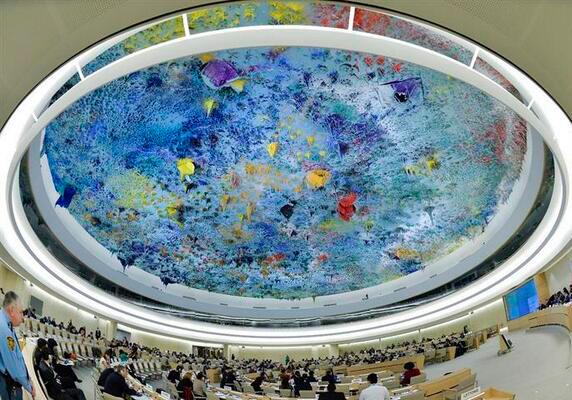Today, the International Commission of Jurists (ICJ) and other non-governmental organizations call on Member States of the UN Human Rights Council to urgently convene a Special Session on the situation in Lebanon to establish an international investigative mechanism into all violations of humanitarian and human rights law committed in the ongoing conflict.
.الرسالة باللغة العربية على هذا الرابط
To Permanent Representatives of Member and Observer States of the United Nations (UN) Human Rights Council:
As civilian casualties continue to mount in Lebanon with the widespread destruction of civilian infrastructure escalating and over 1.2 million people—mostly civilians— forcibly displaced, our organizations call on your government to initiate and/or support the convening of a Special Session of the UN Human Rights Council in order to establish an international investigative mechanism into all violations of international human rights and humanitarian law committed by all parties involved in the ongoing conflict in Lebanon.
The situation in Lebanon has reached a catastrophic stage as a result of intensified military actions by Israel. According to recent data, over 2,867 people have been killed, with more than 13,000 injured as a result of recent Israeli airstrikes and other military actions across the country. According to UNHCR, at least 400,000 people have crossed into Syria since September 23. The attacks have resulted in the deaths of at least 149 refugees, left 29 wounded, and 7 are still missing. The attacks have also caused the internal and external displacement of hundreds of thousands of Syrian refugees in Lebanon, further increasing their vulnerability.
Over the past year, Hezbollah has launched rockets and missiles into towns in northern Israel, killing at least 39 civilians and displacing over 60,000 residents.
Rocket and missile attacks by any party that do not discriminate between military targets and civilians violate the laws of war.
The High Commissioner for Human Rights issued a statement on 1 October 2024 calling on all parties to “clearly distinguish between military targets and civilians and civilian objects in the way they conduct hostilities. They must do all they can to protect the lives of civilians, their homes, and the infrastructure essential to their daily existence, as clearly required by international humanitarian law.” He also reminded all parties to “ensure accountability of those responsible for violations of international humanitarian law that have taken place or are ongoing, whoever the perpetrators may be.”
On 4 October 2024, thirty-one UN Special Procedure experts “deplored Israel’s increasing disregard for international law” and called for “accountability for violations of international law.” The UN Human Rights Council experts stated that there is an Israeli “invasion in violation [of Lebanon’s] territorial integrity.”
The human cost of these attacks is staggering, but the destruction goes beyond the loss of life. Thousands of homes, schools, and hospitals have been reduced to rubble, including through airstrikes that have targeted densely populated residential areas. International humanitarian law clearly prohibits indiscriminate attacks and attacks that disproportionately affect civilians and mandates compliance with precautions which require, in the conduct of military operations, that constant care be taken to spare the civilian population and civilian objects. Despite these clear prohibitions, the ongoing use of explosive weapons in populated civilian areas risks further violations of international law, including war crimes.
The humanitarian impact of the conflict is devastating Lebanon’s already fragile economy, institutions, public infrastructure and social fabric. The UN Human Rights Office has warned that further escalation of hostilities could trigger an overwhelming humanitarian crisis, one that Lebanon is ill-equipped to handle. Essential infrastructure, including hospitals, medical centres, and other facilities, has been attacked, severely impeding humanitarian aid efforts. On 1 October, Israeli forces launched a deadly ground offensive in Lebanon, and with inflammatory rhetoric from Israeli officials threatening “destruction and suffering like we see in Gaza,” the risk of further atrocity crimes is high.
Furthermore, medical personnel have been targeted by the Israeli army during these attacks, and more than 115 healthcare workers have been killed. Strikes against medical infrastructure and healthcare workers are in direct violation of the Geneva Conventions, which require the protection of all medical personnel in times of armed conflict. In addition, the UN has accused Israel of deliberately firing at UN Peacekeepers in Southern Lebanon resulting in the injury of five peacekeepers. Under the laws of war, UN personnel involved in peacekeeping operations, including armed members, are civilians, and deliberate attacks against them and their peacekeeping facilities are unlawful and amount to war crimes.
At this critical moment, we urge your government to act decisively. The human rights and humanitarian situations in Lebanon are spiraling out of control, and without immediate action, the suffering of civilians will only increase. We demand that states activate the tools of the Human Rights Council, by convening a special session and establishing an international investigative mechanism into violations of international human rights and humanitarian law in order to fulfill their responsibility to protect human rights, prevent further violations and pursue accountability for perpetrators.
Signatories
Access Center for Human Rights (ACHR)
Amnesty International
Cairo Institute for Human Rights Studies (CIHRS)
Cedar Centre for Legal Studies (CCLS)
Centre Libanais des Droits de l’Homme (CLDH)
CIVICUS
CNCD – 11.11.11
11.11.11
Euromed Rights
Gulf Centre for Human Rights (GCHR)
Henrich-Böll-Stiftung – Beirut
Human Rights Watch (HRW)
International Bar Association’s Human Rights Institute (IBAHRI)
International Commission of Jurists (ICJ)
International Federation for Human Rights (FIDH)
International Service for Human Rights (ISHR)
Mena Rights Group
Minority Rights Group
PAX
Upinion
Women Now for Development – Lebanon
Contact
Said Benarbia, Director, ICJ Middle East and North Africa Program; t: +41 22 979 3817, e: said.benarbia(a)icj.org
Nour Al Hajj, Communications & Advocacy Officer, ICJ Middle East and North Africa Program; e: nour.alhajj(a)icj.org





